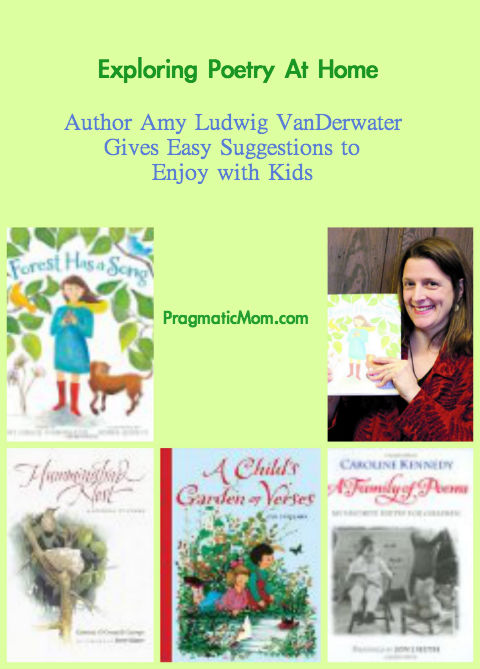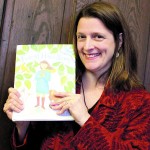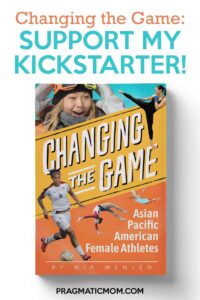For the last day of April and National Poetry Month, I am so excited to welcome my guest author, Amy Ludwig VanDerwater of poetry picture book Forest Has a Song. She has inspired me, a poetry-phobe to explore poetry with her gentle coaxing so I asked her to please write a post on teaching poetry at home with kids.
In concluding my month celebrating National Poetry Month, I hope that all of us feel more comfortable with poetry and will enjoy it the rest of the year with our kids. What poetry books are your favorites? Please share!
Teaching Poetry at Home to Your Children
Laughing and pointing, all five of us sat and watched as Cali and Sage, our two Border Collie mixes, wrestled on the rug. Charmed again by the antics of animals, nine-year-old Henry commented, “You know…if we didn’t have pets, we would be different people.” Henry was right. And his exact words have stayed in my mind for the past two years; they were a spoken poem.
As a mother and teacher, I often hear children express ideas and thoughts in pure poetry, and I believe that making space for poems in family life makes family life more beautiful and whole. By welcoming poems into our days, we deepen our children’s language and appreciation for life.
Read poems together. Consider sprinkling poems into your daily life at breakfast or during evening tooth brushing. Poems are short and tuck perfectly into the nooks of day night. By checking out a new poetry book each time your family visits the library, you will introduce your child (and yourself!) to a variety of poems and poets. Include collections of classics (A FAMILY OF POEMS edited by Caroline Kennedy) and contemporary collections (HUMMINGBIRD NEST by Kristine O’Connell George) so that your child learns many different poem voices. Ask your librarian for suggestions.
Make “Let’s read a poem before bedtime” a refrain in your home. You may even read the same poem again and again, memorizing a favorite verse together. These by-heart poems will live inside of you and your children for decades.
Include but stretch beyond funny favorites so that your son or daughter will understand how poetry can make us think, wonder, and pause for beauty as well as make us giggle. You might even listen to poems while riding in the car. When our children were young, two of our favorite CDs were poems set to music: A CHILD’S GARDEN OF VERSES (poems of Robert Louis Stevenson) and THE DAYS GONE BY (various American poems) both by Ted Jacobs. LEAVE YOUR SLEEP, a collection of classic children’s poetry adapted to music by Natalie Merchant, is also really beautiful.
Listen for the beauty in your child’s spoken language. If your son says, “The bees are dancing with the flowers,” stop and look at him. Say, “That sounds like a poem!” and write it down. Keep a small notebook or digital file of your child’s poems. Even before your child can write, s/he speaks in poems, and you can capture these and read them aloud as a family…now and in the years to come. Remember that poetry is not about rhyme. Rather, it is about meaning. So while many of the poems we read do rhyme, focus on tuning your ears for when your child speaks in metaphors or comparisons. Listen and compliment the music and rhythm and sensory language in his or her daily observations and questions. “You sound like a poet! I am going to write that down!”
Plan for family writing time. Every once in a while, our family will drop everything for family writing time, a special time when everyone writes – even adults. Offer choices of paper and notebooks, pens and pencils, and simply find your own spots to write. Tell your child your writing plans, explaining that you will be writing a thank you note or a poem about the blowing leaves. Then write quietly, encouraging your child to write independently. At the end of fifteen minutes or so, stop and welcome anyone who wishes to share. Compliment warmly, and express what you have enjoyed about your own writing project.
Experiment with simple forms of poetry. When writing poems with children, explore other poetic devices than rhyme. While good rhyme is a joy to read, when young children write in rhyme, they often lose meaning. Teach your children that a list poem is simply a list of favorite things or a list of what’s in the garden, a list of anything! Write a small list together, and twist the end of the poem so that a reader knows it’s finished. For example, a garden list poem might read:
Garden
Peas.
Tomatoes.
Lettuce.
Carrots.
Let’s eat salad!
You might also write a short story or description poems. Write about what something looks like, or something that has happened to you, including your senses. Leave some breaks at the ends of the lines so a reader knows where to pause.
Our Garden
Our garden is green
like a jungle.
Brown bunny visits
each morning.
He hides in our lettuce.
He disappears
when we come outside.
Ears and tail hop away.
Notice how poetry can include a repeating word or line. This is an easy way for a child to get a poem sound into his or her writing.
Gardening Time
It’s time to garden.
We’ll have dirt on our hands.
It’s time to garden.
We’ll have mud on our knees.
It’s time to garden.
We’ll put seeds in the ground.
It’s time to garden.
It’s spring!
Encourage your child to write his or her feelings in the shapes of poems, showing how you do this too. Sharing your own poems, showing how you value poetry, will help your child understand the power and gifts that poems offer. And as you read more and more poems together, you and your child will notice new and different techniques that you’ll want to try in your own writing.
Celebrate with poems. A child’s life is full of milestones, and there is a poem to match each one. Honor these moments and days with poems that you find or write. Why not fold a poem about losing a tooth into a little envelope when that first wiggly one falls out? Write a birthday poem to your child, or slip a silly poem into her lunchbox. Read or sing a goodbye poem together when you bury your cat. Give a gift of poetry on your child’s graduation or wedding day. Let poems be a part of your parenting, and not only will they bring light to your days; poems will enrich the language, the relationships, and the memories of your family.
Click on image of book to examine at Amazon.
To examine any of the items listed, please click on image of item. As an Amazon Associate, I earn from qualifying purchases.
BEST #OWNVOICES CHILDREN’S BOOKS: My Favorite Diversity Books for Kids Ages 1-12 is a book that I created to highlight books written by authors who share the same marginalized identity as the characters in their books.

















Great post! Writing poetry is a wonderful way to help develop a child’s mind and his/her ability to think creatively.
Hi Jill,
I need this advice since I’m bad about poetry. Thanks so much. Amy is such a wonderful ambassador to poetry for us all!
I used to think that all poetry was formal and written in stanza format. There are so many ways to write poetry and young kids love it once they start writing it. There are still a few poems that will still pop into my mind unannounced like Trees and Cat! I first read these more years ago than I would like to remember!
Hi Barbara,
I’m new to poetry too and there are so many poetry formats I’ve never heard of. Catherine Johnson’s blog is where I’m learning about poetry. She’s a poet. I don’t the Trees and Cat poem. I’ll have to look that one up!
Nice post. Actually the point is clear. I too feel developing poetry skills would eventually develop kid’s sense and imagination.
Thanks Jesna. I haven’t been good about reading poetry with my kids but I need to try harder.
Hello!
Thank you so much for linking up on the Kid Lit Blog Hop!
Happy Thursday,
Ang
jugglingactmama.blogspot.com
Thanks Ang!
Fun post! I feel like I’ve been a slacker Mom with infusing our reading with poetry. So much of it is so beautiful. I really need to make a commitment to read and create more poems with my kids. Thanks for linking your post in the Kid Lit Blog Hop.
Hi Renee,
I’m the same! Thanks for hosting Kid Lit Blog Hop!
Nice post Think the post are clear. Writing poetry is really interesting and my kids will love trying this.
Hi Viren,
Please let me know what parts your kids enjoyed! Thanks!
To be very sincere I love poetry from a distance. I do not understand it that much but its something that I would wish my kids can start appreciating now. What a lovely way of teaching it at home.
Thanks so much to Amy VanDerwater for the post! I’m the same as you Viren. We are not doing much with poetry at home but I am now going to try to change that. I signed up for a poem a day free email so small changes, slowly but surely!
Amy is a person who “puts in the time” with being a mom, wife and writer. Her work ethic motivates me so much. Thank you for highlighting her.
Hi Charles,
She seems like a wonderful person. I got that impression from just hearing her on the Poetry Friday panel at KidLitCon. You must know her IRL then?
We are pretty obsessed about poetry over here- I was mesmerized by it as a child- and my kids are delighted to hear the rhymes and the rhythms! Sometimes we have to edit what is really said or how it is said, but my kids LOVE Shel Silverstein’s poems! 🙂 I’m looking forward to doing some of the suggestions in your post- like having them write their own ideas down…we haven’t done that yet, actually!
Hi Tricia,
How wonderful that you and your kids are enjoying poetry at home. We need to do that more! Amy’s post is great, isn’t it? You can tell she’s an expert at teaching poetry to kids. We are going to try to read more poetry at home too.
Great post and ideas! My favorite is writing down poetic things your kids say!
Hi Ann,
You should share the poetic things your kids say on your blog!!! Please?!